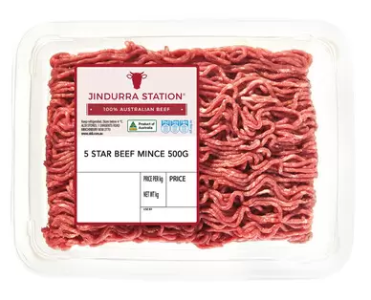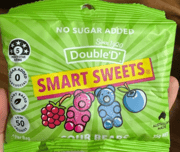Bagging change: ALDI minces plastic waste with new packaging strategy
- Replies 7
In a recent update that affects shoppers across the country, a popular supermarket chain has announced a significant modification to how a popular item is packaged, effective immediately.
This change, aimed at enhancing convenience or sustainability, marks a notable shift in the way consumers interact with a staple grocery item.
Gone are the days of the traditional plastic trays that have long been a staple in the meat aisles.
Instead, ALDI introduced plastic bags for its beef mince products, a change that's not only innovative but also kinder to our planet.
This initiative began with the Jindurra Station 5 Star Beef Mince 500g ($6.99), which now comes in bags that use a staggering 70 per cent less plastic than the old packaging.

However, ALDI didn't stop there. The retailer is also trialling its Jindurra Station Grass Fed 4-Star Beef Mince in these eco-friendly bags.
This is a significant step, considering the popularity of this higher-quality mince among shoppers.
It's a clear signal that ALDI is serious about its environmental responsibilities and is willing to lead by example in the supermarket sector.
An ALDI spokesperson shed light on this strategic move, stating that it's part of the company's broader commitment to sustainability.
‘ALDI is continuing to remove and reduce plastic across our stores, and are always looking for ways to trial new packaging innovations across our range to help achieve our goal of reducing plastic packaging by 25 per cent by 2025,’ they said.
This goal is not only ambitious but also reflects a growing trend in the retail industry to address the urgent issue of plastic waste.
Currently, these new packs are making their debut in Queensland, with a national rollout yet to be announced.
The reaction from customers has been positive, with one Queensland shopper expressing their excitement at the discovery.
‘I have seen the two-star mince packs in bags for a while—but was excited to see the higher quality mince in the same packaging,’ they shared.
‘Sometimes the bags are a little tricky to use, like if you don’t want to use all the meat in one go. But I think it’s a great move. Using less plastic is always a win.’
The recent adjustment in packaging by ALDI reflects ongoing efforts by the retailer to adapt to consumer preferences and market trends.
This change not only impacts how products are presented but also influences customer experiences and perceptions.
Meanwhile, ALDI continues to receive praise for its quality offerings, such as the highly regarded marbled steak, which has garnered enthusiastic reviews from shoppers.
This positive reception underscores ALDI's commitment to maintaining high standards and catering to diverse consumer tastes, further solidifying its position in the competitive retail landscape.
 Have you tried the new mince packaging? Do you find it more convenient, or do you have tips for others on how to best use these bags? Share your thoughts and experiences in the comments below.
Have you tried the new mince packaging? Do you find it more convenient, or do you have tips for others on how to best use these bags? Share your thoughts and experiences in the comments below.
This change, aimed at enhancing convenience or sustainability, marks a notable shift in the way consumers interact with a staple grocery item.
Gone are the days of the traditional plastic trays that have long been a staple in the meat aisles.
Instead, ALDI introduced plastic bags for its beef mince products, a change that's not only innovative but also kinder to our planet.
This initiative began with the Jindurra Station 5 Star Beef Mince 500g ($6.99), which now comes in bags that use a staggering 70 per cent less plastic than the old packaging.

ALDI is testing its Jindurra Station Grass Fed 5-Star and 4-Star Beef Mince in plastic bags. Credit: ALDI Australia
However, ALDI didn't stop there. The retailer is also trialling its Jindurra Station Grass Fed 4-Star Beef Mince in these eco-friendly bags.
This is a significant step, considering the popularity of this higher-quality mince among shoppers.
It's a clear signal that ALDI is serious about its environmental responsibilities and is willing to lead by example in the supermarket sector.
An ALDI spokesperson shed light on this strategic move, stating that it's part of the company's broader commitment to sustainability.
‘ALDI is continuing to remove and reduce plastic across our stores, and are always looking for ways to trial new packaging innovations across our range to help achieve our goal of reducing plastic packaging by 25 per cent by 2025,’ they said.
This goal is not only ambitious but also reflects a growing trend in the retail industry to address the urgent issue of plastic waste.
Currently, these new packs are making their debut in Queensland, with a national rollout yet to be announced.
The reaction from customers has been positive, with one Queensland shopper expressing their excitement at the discovery.
‘I have seen the two-star mince packs in bags for a while—but was excited to see the higher quality mince in the same packaging,’ they shared.
‘Sometimes the bags are a little tricky to use, like if you don’t want to use all the meat in one go. But I think it’s a great move. Using less plastic is always a win.’
The recent adjustment in packaging by ALDI reflects ongoing efforts by the retailer to adapt to consumer preferences and market trends.
This change not only impacts how products are presented but also influences customer experiences and perceptions.
Meanwhile, ALDI continues to receive praise for its quality offerings, such as the highly regarded marbled steak, which has garnered enthusiastic reviews from shoppers.
This positive reception underscores ALDI's commitment to maintaining high standards and catering to diverse consumer tastes, further solidifying its position in the competitive retail landscape.
Key Takeaways
- ALDI supermarket is trialling its Jindurra Station Grass Fed 5-Star and 4-Star Beef Mince in plastic bags, aiming for more environmentally friendly packaging.
- The bags use 70 per cent less plastic than the traditional plastic trays that usually house the mince.
- The new packaging is currently available in Queensland as part of a trial and has not been introduced nationally.
- ALDI's initiative reflected its commitment to reducing plastic packaging by 25 per cent by 2025 as part of broader sustainability efforts.







